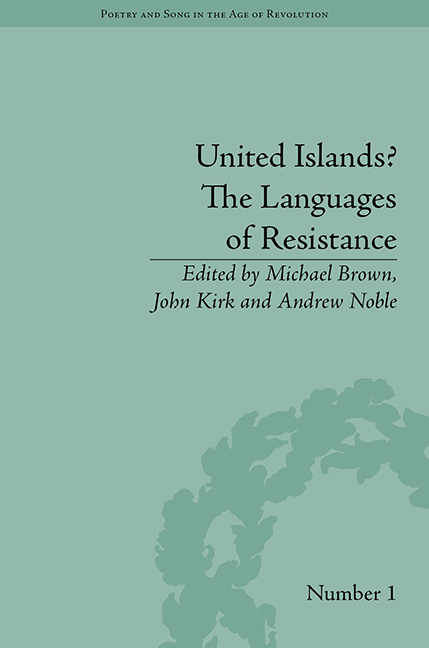Book contents
- Frontmatter
- CONTENTS
- Acknowledgements
- List of Figures and Tables
- List of Contributors
- Introduction: The Languages of Resistance: National Particularities, Universal Aspirations
- 1 Reading the English Political Songs of the 1790s
- 2 Why should the Landlords have the Best Songs? Thomas Spence and the Subversion of Popular Song
- 3 ‘Bard of Liberty’: Iolo Morganwg, Wales and Radical Song
- 4 Canonicity and Radical Evangelicalism: The Case of Thomas Kelly
- 5 Charlotte Brooke's Reliques of Irish Poetry: Eighteenth-Century ‘Irish Song’ and the Politics of Remediation
- 6 Homology, Analogy and the Perception of Irish Radicalism
- 7 Lost Manuscripts and Reactionary Rustling: Was there a Radical Scottish Gaelic Poetry between 1770 and 1820?
- 8 Virile Vernaculars: Radical Sexuality as Social Subversion in Irish Chapbook Verse, 1780–1820
- 9 Thomas Moore and the Problem of Colonial Masculinity in Irish Romanticism
- 10 Radical Politics and Dialect in the British Archipelago
- 11 ‘Theaw Kon Ekspect No Mooar Eawt ov a Pig thin a Grunt’: Searching for the Radical Dialect Voice in Industrial Lancashire and the West Riding, 1798–1819
- Afterword: The Languages of Resistance
- Notes
- Works Cited
- Index
2 - Why should the Landlords have the Best Songs? Thomas Spence and the Subversion of Popular Song
- Frontmatter
- CONTENTS
- Acknowledgements
- List of Figures and Tables
- List of Contributors
- Introduction: The Languages of Resistance: National Particularities, Universal Aspirations
- 1 Reading the English Political Songs of the 1790s
- 2 Why should the Landlords have the Best Songs? Thomas Spence and the Subversion of Popular Song
- 3 ‘Bard of Liberty’: Iolo Morganwg, Wales and Radical Song
- 4 Canonicity and Radical Evangelicalism: The Case of Thomas Kelly
- 5 Charlotte Brooke's Reliques of Irish Poetry: Eighteenth-Century ‘Irish Song’ and the Politics of Remediation
- 6 Homology, Analogy and the Perception of Irish Radicalism
- 7 Lost Manuscripts and Reactionary Rustling: Was there a Radical Scottish Gaelic Poetry between 1770 and 1820?
- 8 Virile Vernaculars: Radical Sexuality as Social Subversion in Irish Chapbook Verse, 1780–1820
- 9 Thomas Moore and the Problem of Colonial Masculinity in Irish Romanticism
- 10 Radical Politics and Dialect in the British Archipelago
- 11 ‘Theaw Kon Ekspect No Mooar Eawt ov a Pig thin a Grunt’: Searching for the Radical Dialect Voice in Industrial Lancashire and the West Riding, 1798–1819
- Afterword: The Languages of Resistance
- Notes
- Works Cited
- Index
Summary
Introduction
This chapter is devoted to the English Radical Thomas Spence and his use of popular song as a medium for the dissemination of his ideas. After an account of Spence's early life in Newcastle upon Tyne and his activities in London, it goes on to discuss the importance of his ‘free and easy’ gatherings in taverns as a forum for radical debate at a time when political meetings were outlawed. A number of Spence's songs are discussed, demonstrating how he parodied popular and/or patriotic songs. Although Spence used other media, including graffiti and coins, to propagate his message in ways that would evade sanctions, I argue that song was particularly important to him because, as a popular medium, it created a convivial atmosphere that helped to bond his followers.
Spence's Early Life and Influences
Thomas Spence was born on 21 June 1750 on the Quayside, which was then one of the poorest areas of Newcastle upon Tyne. His father Jeremiah was a native of Aberdeen who had settled in Newcastle some eleven years previously, working as a netmaker and shoemaker and later becoming a hardware dealer. Although this places him in the artisan/small business rather than the labouring class, the family could not have been wealthy, since Thomas was one of nineteen children. All that we know about Thomas Spence's formal education is that, according to P. M. Ashraf, he ‘began his working life at his father's trade of netmaking at the age of ten after some schooling’. However, by Spence's own account in The Important Trial of Thomas Spence Jeremiah Spence took an active part in his sons' education:
My father used to make my brothers and me read the Bible to him while working in his business, and at the end of every chapter, encouraged us to give our opinions on what we had just read. By these means I acquired an early habit of reflecting on every occurrence which passed before me, as well as on what I read.
- Type
- Chapter
- Information
- United Islands?The Languages of Resistance, pp. 51 - 62Publisher: Pickering & ChattoFirst published in: 2014

